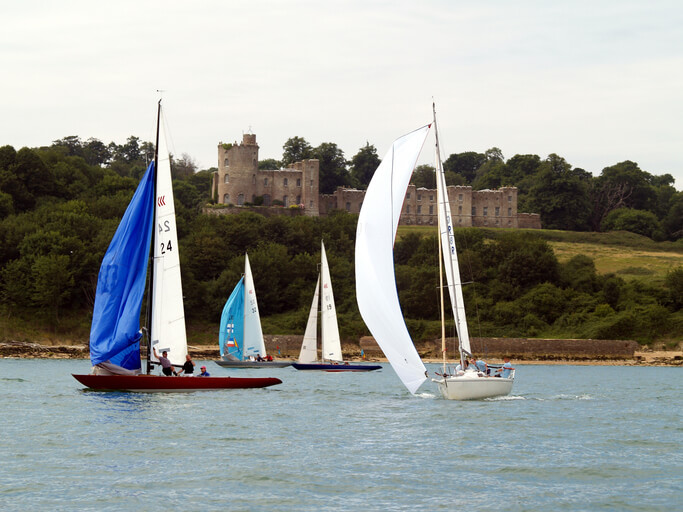How long does it take to cross the English Channel?
25 July 2025

Sailing across the English Channel is a dream for many sailors and is perfectly achievable when you know what to expect and how to prepare for the trip.
Here, we share how long it takes to cross the English Channel yourself, popular routes to choose from, and some top tips for ensuring a safe and enjoyable journey.
Why sail the English Channel?
There are many reasons why both new and experienced sailors might like to take their boat across the English Channel.
1. It’s a challenging experience
Crossing one of the world’s busiest shipping lanes (when sailing from Dover to Calais) is something to celebrate. This journey requires exceptional planning and navigation skills, plus confidence and resilience, making it an accomplishment to be proud of. Check out our guide to getting internet at sea to make things easier.
2. Adventure and freedom
Whichever route across you choose to take, sailing provides a unique sense of freedom. You’re not just going from A to B; you’re setting out on an adventure that you’re sure to remember for a lifetime.
3. Skill development
Sailing across the English Channel yourself allows you to boost key sailing skills, such as tidal navigation, weather reading, and collision avoidance. Even seasoned sailors can learn plenty with a trip across the Channel.
4. Connection with maritime history
The English Channel has a rich history of crossings, from wartime evacuations to solo endurance records. Sailing this famous stretch of water connects you to centuries of nautical heritage and provides the opportunity to experience the waters for yourself.
5. Flexible travel
Sailing across the Channel yourself gives you ultimate flexibility when it comes to your travel itinerary. Take the opportunity to explore coastal towns in France at your own pace without having to schedule your adventure around ferry, train, or plane times.
How long does it take to cross the English Channel?
Crossing the English Channel from Dover to Calais by sailboat can take as little as four hours, depending on the type of boat, the tides, and the weather conditions.
In less favourable conditions, the journey can take several hours, or even a whole day. To sail across the Channel from Cornwall to Brittany takes around 20 hours for experienced sailors, with journey times of up to 28 hours if you require frequent breaks.
The time of day you choose to sail can impact how long it takes to cross. Daylight provides better visibility for navigation and makes it easier to spot other vessels, fishing buoys, and potential hazards. This is especially crucial when approaching foreign ports where landmarks and navigational aids may be less familiar.
Sailing during the day also allows for better planning and adjustment to tidal streams. It makes entering ports easier and will typically result in more comfortable sailing temperatures, too.
For the quickest English Channel crossing by sailboat, choose a day with favourable winds, research tide times, sail with an experienced crew, and take minimal rest stops.
Popular routes across the Channel
The shortest and most popular route across the English Channel is between Dover and Calais. The distance between the two coastlines is approximately 30 nautical miles (depending on your start and end points) and can be completed in as little as four hours. While this is the most direct route, there are busy shipping lanes to navigate, which can make for a challenging experience.
Other route options include Falmouth to Camaret-sur-Mer (around 112 nautical miles), Dartmouth to North Brittany (around 90 nautical miles), and the Solent to Roscoff (around 110 nautical miles). While these routes are typically quieter than sailing between Dover and Calais, the trip will be considerably longer.
Key factors that can affect crossing time
Many factors can affect how long it takes to cross the English Channel. These include:
- Wind – As with all sailing adventures, wind speed and direction have a significant impact on crossing the Channel. Be aware of strong headwinds, which can negatively affect your journey time.
- Tides – The Channel experiences tidal currents, which can affect the time it takes to sail between England and France. Choose to cross during favourable tidal streams to ensure a smooth crossing.
- Route – As mentioned, crossing between Dover and Calais is the quickest option. Other routes have their advantages, but will take longer to complete.
- Boat speed and size – The faster your sailboat, the quicker you’ll be able to cross the Channel. Larger sailboats may allow for a speedier crossing, especially during challenging weather conditions.
- Weather – Severe weather, such as strong winds and rain, can affect your crossing time and make the journey more challenging. Make sure you thoroughly consult the weather forecast when planning your trip, and read our tips for safely boating in a storm.
Small boats crossing the Channel: What to know
While sailing across the English Channel yourself is a fun and rewarding experience, there are some important points to consider.
For example, you may consider having the following documents on board with you:
- Passport (every crew member)
- Certificate of registration
- Proof of VAT status (where applicable)
- Ship Radio Licence
- Boat insurance
- Certificate of competence (ICC) or a RYA Day Skipper qualification
- It’s also recommended to sail with several safety items, such as:
- Life jackets
- Flares
- VHF radio
- Life raft
- Personal locator beacons
- Seasickness medication
Tips for a safe and efficient crossing
- Plan your route carefully to avoid delays and unexpected challenges
- Check tides and currents in advance
- Monitor the weather via marine forecasts – for example, MET Office or Windy
- Maintain regular radio contact and let someone know your planned route and ETA
- Ensure you understand how to navigate busy shipping lanes
- Get your boat sea-ready and carry out a full maintenance check before sailing
- Carry paper charts as a backup to electronic systems
- Sail with at least one other experienced sailor
- Pack emergency and survival items for your trip
- Prepare and safely store the documentation you need
Specialist yacht and sailboat insurance through Craftinsure
Embarking on an adventure in your yacht or sailboat? You may want to protect your investment with specialist insurance.
Specialist yacht insurance through Craftinsure provides up to £5m third-party cover and protects your boat against loss or damage from fire or theft. Get an instant online quote today.
Please note the information provided on this page should not be taken as advice and has been written as a matter of opinion. For more on insurance cover and policy wording, see our homepage.


